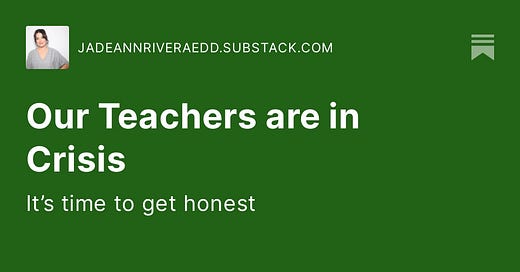Today’s leaders are required to have multiple contingency plans, a well-developed sense of agility, and an iron-fisted grip on their “why.” As for the leaders themselves, they also have requirements: the freedom to do the right thing and act in accordance with their values. I can’t think of a single profession better poised to navigate the terms outlined above than an educator. Every day, in both large and small ways, educators push forward, follow through, and act in the best interest of those they serve because they care about the future of humanity.
That being said, they’re in crisis. Nearly every day my Twitter feed shows at least one or two teachers who, despite not wanting to, plan to retire from education. They cite a lack of professional autonomy and support, along with increased restriction and oppressive oversight, as the causes.
The National Education Association, the largest teachers union in America, polled three million American teachers in January 2022. They found that, “More than half (55%) of members plan to leave education sooner than planned because of the pandemic…” (Jotkoff, 2022). In the survey, teachers shared that everything from poor ventilation in their physical classrooms to staffing shortages were the reasons why. More and more teachers are feeling physically unsafe in the classroom while also bearing the weight of increased responsibility on top of an already full workload.
For many, the demands placed on the typical classroom teacher feel unfair and certainly not in alignment with the lip service paid regarding their heroic and altruistic efforts. While the world calls teachers “heroes” in public, in private they’re gaslit and undercut at nearly every level. Educators aren’t leaving education because they do not want to teach—they are leaving because teaching under these constraints endangers their mental and, in some cases, physical health.
A moral injury occurs when a professional, one typically involved in an altruistic profession like teaching or nursing, is put in a position to make a decision that does not align with their values or sense of right and wrong. Even before the pandemic, many educators were speaking out about the harm done in their schools as draining their morale and willingness to stay in the profession. This was and is particularly true in schools with large Black, indigenous, and children of color populations and students living in under-resourced communities (Sugrue, 2019). Teachers know that they are complicit in harmful education policies and practices, and they’re loudly leaving the profession as a result. This is in direct opposition to what the world needs most—intelligent, responsible, and caring teachers.
Teachers are the lynchpin in our entire educational system. One could make the case that they’re the linchpin to our entire societal structure. What will happen if we continue to alienate and disregard their concerns? Nothing good! Which is heartbreaking, because after the last few years, it’s crystal clear something good is what we all need most.
Here’s something good: micro-schools. In this newsletter, I’ll continue to explain why micro-schools are vital to solving the problems plaguing conventional, modern education. I’ll share the most relevant research showcasing the need for micro-schools as alternative education environments for our most vulnerable youth. I’ll also share my experience, joy, and deeply held beliefs designing, launching, and leading micro-schools for the last fifteen years. And for my paid subscribers, I will offer the beginnings of a roadmap outlining the steps you can take to create your own micro-school.
As always, thank you so much for being here!
More, soon,
Jade
Jotkoff, E. (2022, February 1). NEA survey: Massive staff shortages in schools leading to educator burnout; alarming number of educators indicating they plan to leave profession | NEA. Https://Www.Nea.Org/. Retrieved May 18, 2022, from https://www.nea.org/about-nea/media-center/press-releases/nea-survey-massive-staff-shortages-schools-leading-educator





Hi Jade, where can I find the reference for (Sugrue, 2019), which you cited in this section: "Even before the pandemic, many educators were speaking out about the harm done in their schools as draining their morale and willingness to stay in the profession. This was and is particularly true in schools with large Black, indigenous, and children of color populations and students living in under-resourced communities." (Sugrue, 2019).